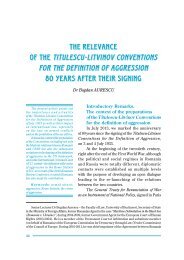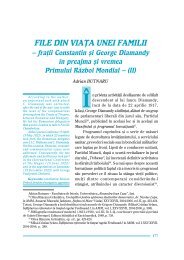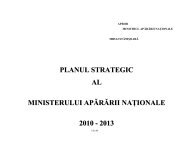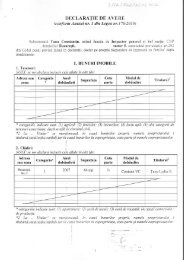Create successful ePaper yourself
Turn your PDF publications into a flip-book with our unique Google optimized e-Paper software.
confidence among the region’s countries. Together<br />
with the Community of Democratic Choice and<br />
other regional initiatives like GUAM, all of them<br />
contributed to the enhancement of regional cooperation<br />
and exchanges, fostering a better security<br />
environment.<br />
Romania and Greece are both generally satisfied<br />
regarding the huge achievements fulfilled<br />
under BSEC umbrella, but they also acknowledge<br />
some problems which need solutions, like the lack<br />
of effectiveness in sensitive realms such as energy<br />
infrastructures, proliferation of weapons, frozen<br />
conflicts, also the slow mechanism of implementing<br />
decisions and the lack of sufficient financial funds.<br />
Together will the other members, they will try to<br />
improve its activity and expand its cooperation<br />
areas, for the well-being of the region’s peoples.<br />
We are, now, at the beginning of a new century,<br />
which we hope will bring much more cooperation<br />
and a more stable environment than the previous<br />
one. There is a need for more cooperation in the<br />
Black Sea Area and even in the Balkans, of<br />
identifying common interests and common visions.<br />
Following the end of the Cold War, the international<br />
community found new perspectives and new<br />
mechanisms for ensuring regional cooperation and<br />
stability.<br />
As we all know, the Western Balkans had been<br />
an area of confrontation, turmoil and instability<br />
for a very long time. Now, the situation seems more<br />
stable and predictable, as most of the countries in<br />
Western Balkans are on their way to EU and NATO<br />
integration. What the community of experts and<br />
the policy makers had the opportunity to see, during<br />
these long years, is that the logic of cooperation is<br />
much more profitable and useful than the logic of<br />
confrontation. Those states and also ethnicreligious<br />
communities that tries to play a zero-sum<br />
game against their neighbors and ‘rivals’ usually<br />
failed in their strategies, had a difficult and inconomy<br />
went bad. All of them eventually understood<br />
that the security through cooperation is the best<br />
answer to an international environment affected<br />
by globalization and by the new risks and challenges.<br />
A win-win strategy is the only reasonable<br />
solution for a peaceful coexistence of the democratic<br />
states. Of course, the strong states, those<br />
which had a socio-political cohesion and a workable<br />
economy, are in a much better position to enter<br />
effective forms of cooperation than the weak or<br />
failing states. The strong ones can rely on the<br />
consent of their populations when they decide to<br />
cooperate. The democratic consent is the best<br />
guarantee for the popular support for inter-state<br />
cooperation.<br />
So, the Balkan countries were generally<br />
speaking, successful in their efforts to modernize,<br />
to transform and improve, and they did it by<br />
accepting to play the game of the cooperation,<br />
either in an institutionalized form, or in a informal<br />
one. But we should remember that the most<br />
effective organizations of cooperation have been<br />
promoted from abroad. The Stability Pact for South<br />
East Europe, the SECI and Royaumont initiatives<br />
were all brought by the EU, US and other states<br />
and organizations.<br />
Today, the Greater Black Sea Region is in a<br />
position that suggests some resemblance with the<br />
Balkans ten years ago. There are very different<br />
countries, with specific visions and interests, each<br />
has its own history and foreign policy, and<br />
therefore one cannot speak about a common Black<br />
Sea identity.<br />
In contrast with the Euro-Atlantic space,<br />
security is not conceived, imagined as indivisible<br />
and unique. Usually, each country wanted to<br />
enhance its own security by itself or by a limited<br />
form of cooperation. Like the Western Balkans,<br />
the Greater Black Sea region is a regional security<br />
complex. There are patterns of interaction ranging<br />
from hostility and mistrust to partnership and even<br />
friendship. This reflects historic preferences,<br />
happy and unhappy events for each nation. But<br />
history should not become an insurmountable<br />
obstacle if states really want to forge cooperative<br />
ties. Nobody is so radical to stand that the nations<br />
should rewrite their history only to improve<br />
relations with the other ones, by forgetting sensitive<br />
issues, remembrances of discord and hostility.<br />
History doesn’t have to be neglected because it is<br />
a bench-mark, a vital element for a people’s identity.<br />
Only it should be interpreted in a constructive way.<br />
For those states which had a glorious history<br />
of regional hegemony in areas like the Black Sea<br />
and the Balkans, it must be clear that the ‘animus<br />
dominandi’ spirit (quoting famous IR theorist Hans<br />
Morgenthau 21 ) is not well suited for the contemporary<br />
world. Hegemony, be it a hard military one<br />
or a softer one, usually creates mistrust, rivalry<br />
and even hatred. In a globalized world when<br />
everybody can see closely what the others are<br />
78 ����� Review of Military History �����

















